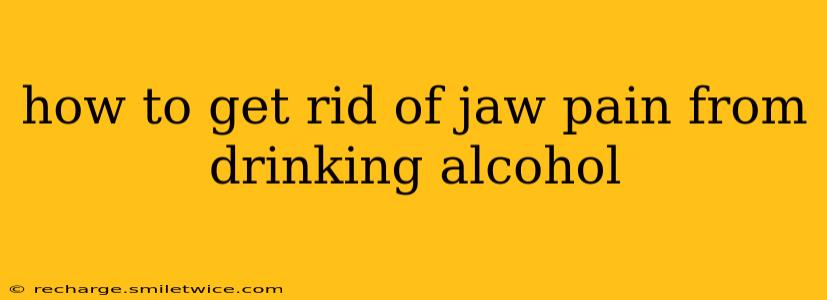Experiencing jaw pain after drinking alcohol? You're not alone. While not a universally experienced symptom, many individuals report jaw clenching, tension, or even outright pain following alcohol consumption. This discomfort can range from a mild ache to a debilitating spasm, significantly impacting daily life. Understanding the connection between alcohol and jaw pain is crucial to finding effective relief. This comprehensive guide explores the causes, remedies, and preventative measures to help you manage this frustrating issue.
Why Does Alcohol Cause Jaw Pain?
Alcohol's impact on the jaw isn't fully understood, but several factors contribute to post-drinking jaw pain:
-
Muscle Relaxation and Tension: Alcohol is a depressant, initially relaxing muscles. However, this relaxation can transition into increased muscle tension and spasms, particularly in the jaw, leading to pain and discomfort. This is especially true if you're already prone to bruxism (teeth grinding) or temporomandibular joint (TMJ) disorders.
-
Dehydration: Alcohol is a diuretic, meaning it increases urination and can lead to dehydration. Dehydration can exacerbate muscle tension and inflammation, contributing to jaw pain.
-
Sleep Disturbances: Alcohol might initially induce sleep, but it often disrupts sleep cycles, leading to poor-quality rest. This fragmented sleep can increase stress and tension in the jaw muscles, worsening pain.
-
Increased Stress and Anxiety: While alcohol might seem to reduce anxiety initially, it can actually exacerbate underlying stress and anxiety later, leading to increased jaw clenching and tension.
-
Underlying Medical Conditions: Pre-existing conditions like TMJ disorders or sleep apnea can be significantly worsened by alcohol consumption, leading to intensified jaw pain.
How to Relieve Jaw Pain After Drinking Alcohol
Addressing jaw pain after drinking involves a multi-pronged approach focusing on immediate relief and long-term prevention:
1. Hydration: Replenish Lost Fluids
Dehydration contributes significantly to muscle tension. Drink plenty of water to rehydrate your body. Electrolyte-rich drinks can also be beneficial in restoring fluid balance.
2. Gentle Jaw Massage: Ease Muscle Tension
Gently massage your jaw muscles. Apply firm, but gentle, pressure to the areas experiencing pain, moving your fingers in circular motions. This can help relax tense muscles.
3. Over-the-Counter Pain Relief: Manage Discomfort
Over-the-counter pain relievers like ibuprofen or naproxen can help reduce inflammation and pain. Always follow the dosage instructions on the label.
4. Heat or Cold Compress: Soothe Inflammation
Applying a warm compress or a cold pack (wrapped in a cloth) to your jaw can offer relief. Experiment with both to see which provides more comfort. Heat often works better for muscle tension, while cold can be more effective for inflammation.
5. Rest and Relaxation: Promote Healing
Get plenty of rest. A restful sleep allows your body to recover and reduce muscle tension. Consider relaxation techniques like deep breathing or meditation to reduce stress.
6. Avoid Clenching or Grinding: Protect Your Jaw
Consciously try to relax your jaw muscles. Avoid clenching or grinding your teeth. This is easier said than done, but focused effort can help.
What if the Jaw Pain Persists?
If your jaw pain persists or worsens despite these measures, it's crucial to consult a healthcare professional. Persistent jaw pain could indicate an underlying condition like TMJ disorder or other dental issues. A doctor can provide a proper diagnosis and recommend appropriate treatment.
How to Prevent Jaw Pain from Alcohol in the Future?
Preventing future alcohol-related jaw pain involves mindful consumption and lifestyle adjustments:
-
Moderate Alcohol Intake: Limit your alcohol consumption to reduce the likelihood of experiencing negative side effects.
-
Stay Hydrated: Drink plenty of water throughout the day, especially when consuming alcohol.
-
Manage Stress: Implement stress-reducing techniques such as exercise, yoga, or meditation to reduce muscle tension.
-
Maintain Good Oral Hygiene: Practice good oral hygiene to prevent issues like bruxism and TMJ disorders.
-
Consider a Mouthguard: If you suspect you grind your teeth, consider wearing a mouthguard, especially when drinking alcohol.
By understanding the causes and employing these strategies, you can effectively manage and potentially prevent jaw pain associated with alcohol consumption. Remember that seeking professional medical advice is crucial if your pain persists or worsens.
